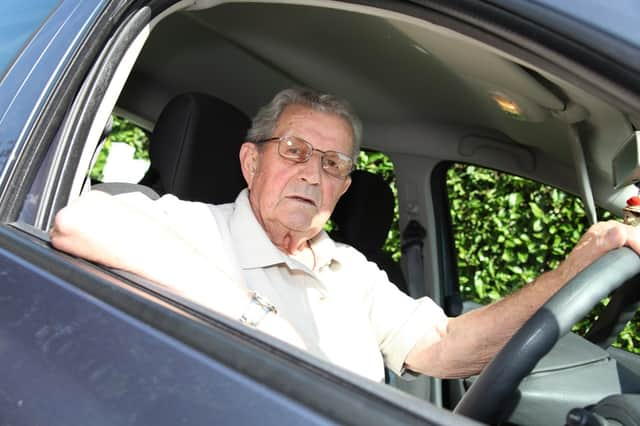Older driver fitness tests: 75% back health checks for over-70s to keep their licence - what is current law?


More than three quarters of motorists think older drivers should face compulsory fitness to drive tests to keep their licence, according to a new poll.
The survey of drivers of all ages found that 77% agree with the idea of mandatory tests for the over-70s to ensure they are still healthy enough to drive. It also found that half believed drivers should be made to surrender their licence once they reach a certain age.
Advertisement
Hide AdAdvertisement
Hide AdThe study by insurance comparison service Forbes Advisor exposed divided opinions on the driving abilities of different age groups, with younger drivers regarded as the most dangerous but also significant negative attitudes towards older motorists.
Currently, drivers aged 70 and over must apply to renew their licence every three years. However, unless they are diagnosed with a declarable medical condition they do not have to undergo any tests or checks. Previously, it has been suggested older drivers should have to resit their driving test to prove they are still fit to drive.
The survey asked drivers whether they believed drivers aged 70 and over should face mandatory health and fitness checks in order to keep their licence, 77% of people said yes, with 62% of respondents over 70 saying they were in favour of being tested.
A total of 51% of drivers also thought there should be a maximum age for driving, with the biggest proportion believing this should be somewhere in the early-80s. Unsurprisingly, this idea was far less popular among drivers aged 70 or over, with more than half (55%) rejecting the suggestion.
Advertisement
Hide AdAdvertisement
Hide AdKevin Pratt, car insurance spokesperson at Forbes Advisor, said: “The UK’s roads are getting more crowded, with improved longevity playing its part as drivers stay behind the wheel for longer. But how do we manage the potential problem of having an increasing number of drivers with declining faculties and health problems that might impair their driving ability and lead to accidents?
“Many older drivers will tell you that their experience and cool-headedness make them safer drivers in the same way that inexperience and exuberance can make those under 25 a riskier proposition. But others will argue that a mandatory health test for those above a certain age makes sense, as only those that fail will be affected, with wider benefits for road-users generally.”
The number of drivers aged 70 or over has soared in recent years, rising from 4.5 million in 2016 to 5.6m in 2020. Three-quarters of over-70s now hold a licence and they account for around 14% of all UK licence holders. According to pre-pandemic government data, over-70s are involved in just under 14% of fatal or serious accidents, although the data does not apportion blame.
Separate figures from the Association of British Insurers show that the frequency and value of insurance claims starts to increase among drivers once they reach the age of 66. Although claim frequency remains low compared to drivers aged 35 and under, the cost of claims rises sharply among drivers over the age of 75.
Advertisement
Hide AdAdvertisement
Hide AdCaroline Abrahams, Charity Director at Age UK, emphasised that driving was an important freedom for many older people but said drivers should be honest with themselves about their abilities.
She told National World: “We are all required to disclose certain medical conditions to the DVLA that could possibly impede our capacity to drive safely. These include health problems like stroke, Parkinson’s Disease and glaucoma, most of which are a lot more common as we get older.
"The ability to keep driving makes a huge psychological and practical difference to many older people, but the reality is that for many of us the time will come when the smart thing to do is to hang up the keys for good. Knowing when the right time is to call it a day with driving can be difficult and sometimes our loved ones may realise that’s the position we have reached before we do ourselves.”
She added: “Everyone has to take responsibility for being safe behind the wheel, regardless of age, but if the driving of someone close to you is giving you serious cause for concern then having an honest conversation with them about it is probably the best initial approach. You may also want to refer them to the comprehensive information about driving in later life which Age UK produces.
Comment Guidelines
National World encourages reader discussion on our stories. User feedback, insights and back-and-forth exchanges add a rich layer of context to reporting. Please review our Community Guidelines before commenting.
